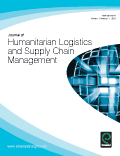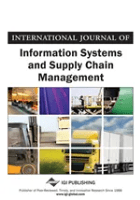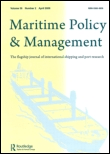
International Journal of Logistics Management
Scope & Guideline
Empowering Innovations in Supply Chain Management
Introduction
Aims and Scopes
- Sustainability in Supply Chains:
The journal emphasizes the integration of sustainable practices within supply chains, exploring how logistics can contribute to environmental goals and corporate social responsibility. - Digital Transformation and Technology Integration:
Research on the impact of digital technologies, including AI, blockchain, and IoT, on supply chain performance and resilience is a core focus, highlighting how businesses can leverage these technologies for competitive advantage. - Supply Chain Resilience and Risk Management:
The journal frequently addresses the strategies and frameworks for enhancing supply chain resilience, especially in the face of disruptions like pandemics or natural disasters. - Collaboration and Network Dynamics:
Investigations into inter-organizational relationships, collaborative practices, and governance mechanisms within supply chains are prominent, reflecting the need for synergy among supply chain partners. - Emerging Markets and Global Supply Chains:
A significant portion of the research highlights the unique challenges and opportunities faced by supply chains in emerging economies, providing insights into local practices and global integration. - Agility and Flexibility in Supply Chain Operations:
The journal explores how supply chains can adapt to changing market conditions and consumer demands through agile practices and flexible operational strategies. - Human Factors in Supply Chain Management:
Research on the implications of human behavior, leadership, and organizational culture within supply chains is gaining traction, emphasizing the role of people in logistics effectiveness.
Trending and Emerging
- Sustainable Practices and Circular Economy:
Research focusing on sustainability and the circular economy is on the rise, with increasing scrutiny on how logistics can facilitate environmental stewardship and resource efficiency. - Digital Supply Chain Innovations:
There is a growing emphasis on the role of digital technologies such as AI, blockchain, and big data analytics in transforming supply chain operations and improving decision-making. - Social Responsibility and Inclusivity:
Emerging themes around social sustainability, including gender equality and inclusivity in supply chain practices, are gaining traction, reflecting broader societal concerns. - Resilience in Supply Chains Post-COVID-19:
The COVID-19 pandemic has catalyzed research into resilience strategies, with a focus on how supply chains can better prepare for and respond to global disruptions. - Integration of Logistics and Supply Chain Functions:
An increasing number of studies are exploring the integration of logistics with other business functions (e.g., marketing, finance) to enhance overall performance and responsiveness. - Consumer-Centric Supply Chain Models:
There is a notable shift towards understanding consumer behavior and preferences, driving research on how logistics can be tailored to meet evolving customer demands. - Collaboration and Partnerships in Supply Chains:
Research on collaborative frameworks and partnerships among supply chain stakeholders is gaining momentum, as companies seek to enhance efficiency and innovation through collective efforts.
Declining or Waning
- Traditional Logistics Models:
Research centered on conventional logistics models and practices is declining as the field increasingly embraces innovative and technology-driven approaches. - Single-Industry Focus:
There has been a noticeable reduction in papers that focus solely on logistics within a single industry context, as interdisciplinary and cross-sectoral studies gain more relevance. - Cost-Cutting Strategies:
The emphasis on logistics and supply chain strategies aimed primarily at cost reduction is waning, with a growing preference for value creation and sustainability-oriented approaches. - Static Analysis of Supply Chain Structures:
Static analyses that do not consider dynamic factors influencing supply chains are becoming less common, as researchers favor more adaptable and real-time frameworks. - Overemphasis on Theoretical Constructs without Empirical Evidence:
The journal is moving away from purely theoretical studies without practical implications, favoring research that provides actionable insights and empirical validation.
Similar Journals

Journal of Humanitarian Logistics and Supply Chain Management
Elevating operational excellence in humanitarian logistics.Journal of Humanitarian Logistics and Supply Chain Management is a premier academic journal published by Emerald Group Publishing Ltd that addresses the critical intersection of logistics and supply chain management within humanitarian contexts. With an ISSN of 2042-6747 and an E-ISSN of 2042-6755, this journal has established itself as a leading resource for researchers, professionals, and students dedicated to enhancing operational efficiency and effectiveness in disaster relief and humanitarian aid. The journal enjoys a distinguished standing with a Q1 ranking in Management Information Systems and a Q2 ranking in Management Science and Operations Research, reflecting its contributions to the field and its significant impact factor, placing it in the 75th percentile among its peers in Scopus rankings. Covering a spectrum of topics from innovative supply chain strategies to responsive logistics frameworks, the Journal of Humanitarian Logistics and Supply Chain Management provides valuable insights and practical solutions that are essential for enhancing resilience and responsiveness in humanitarian operations as it converges through the years from 2011 to 2024. Researchers and industry practitioners alike are encouraged to engage with its robust articles, fostering collaboration and knowledge exchange to meet the evolving challenges faced in humanitarian logistics.

Operations and Supply Chain Management-An International Journal
Empowering decision-makers through cutting-edge supply chain knowledge.Operations and Supply Chain Management-An International Journal is a premier scholarly publication focused on cutting-edge research in the fields of operations management, supply chain processes, and decision sciences. Published by OSCM FORUM in Indonesia, the journal is dedicated to advancing knowledge and practice within these critical domains. As a Q2 ranked journal in both Information Systems and Management and Management Information Systems, and recognized in broader categories by Scopus, this journal stands out with significant impact metrics, including high percentile rankings in relevant fields. With a commitment to disseminating impactful research from 2018 to 2024, it aims to support researchers, professionals, and academia in enhancing operational effectiveness and innovation. While the journal operates under a traditional publishing model, its valuable content remains accessible to a global audience keen on the latest scholarly advancements in [Operations and Supply Chain Management]. This journal is an essential resource for those seeking profound insights and peer-reviewed articles that address both theoretical and practical challenges in operations and supply chain dynamics.

Asia Pacific Journal of Marketing and Logistics
Empowering Scholars and Practitioners in Marketing and Logistics.Asia Pacific Journal of Marketing and Logistics is a premier publication dedicated to advancing research in the fields of marketing and logistics within the dynamic Asia Pacific region. Published by EMERALD GROUP PUBLISHING LTD in the United Kingdom, this esteemed journal boasts impressive rankings, holding a Q1 classification in Business and International Management and Q2 classifications in both Marketing and Strategy and Management as of 2023. With its rich history from 1993 to 2024, the journal has established itself as a critical platform for scholars and practitioners, providing insights that drive innovative practices and strategies. Although it does not currently offer open access options, it remains essential reading for anyone involved in these fields, evidenced by its strong Scopus rankings and high percentiles in various categories. By fostering discussions on contemporary issues and emerging trends, the Asia Pacific Journal of Marketing and Logistics is committed to contributing significantly to the discourse within academia and industry.

INTERNATIONAL JOURNAL OF PHYSICAL DISTRIBUTION & LOGISTICS MANAGEMENT
Transforming Logistics Practices through Scholarly ExcellenceINTERNATIONAL JOURNAL OF PHYSICAL DISTRIBUTION & LOGISTICS MANAGEMENT, published by EMERALD GROUP PUBLISHING LTD, stands as a premier scholarly platform dedicated to advancing the knowledge and practices in the fields of logistics and supply chain management. With an impressive impact factor and consistently ranked in the Q1 quartile in both Management of Technology and Innovation and Transportation, this journal has established itself as a critical resource for researchers, professionals, and students alike. The journal's coverage extends from 1990 to 2024, making it a vital archive of the evolution and trends in physical distribution and logistics. Although it does not offer an open access option, its meticulous peer-review process ensures that each article contributes significant insights and innovations to the field. Through its rigorous selection of topics, the journal facilitates a robust dialogue on emerging practices, technologies, and policies affecting physical distribution and logistics management globally.

International Journal of Industrial Engineering and Management
Advancing industrial insights for a dynamic future.The International Journal of Industrial Engineering and Management, published by the University of Novi Sad, Faculty of Technical Sciences, serves as a vital platform for advancing knowledge in the fields of industrial engineering and management. With an ISSN of 2217-2661 and an E-ISSN of 2683-345X, this open access journal has been disseminating high-quality research since 2010, ensuring that findings are freely accessible to researchers, professionals, and students globally. The journal operates out of Serbia, with a committed editorial team dedicated to fostering interdisciplinary dialogue in a rapidly evolving industrial landscape. Recognized for its impact, the journal holds a Q2 category ranking in both Business, Management and Accounting and Industrial and Manufacturing Engineering, reflecting its valuable contributions to the field. With converged years from 2010 to 2024 and a significant presence in Scopus rankings, this journal not only showcases innovative research but also encourages applied methodologies that bridge theory and practice, making it an essential resource for anyone involved in industrial engineering and management.

International Journal of Information Systems and Supply Chain Management
Navigating the Future of Supply Chains through Insightful ResearchThe International Journal of Information Systems and Supply Chain Management (ISSN: 1935-5726, E-ISSN: 1935-5734), published by IGI GLOBAL, serves as a crucial platform for disseminating research in the intersecting fields of information systems and supply chain management. Established in 2008 and continuing through 2024, this journal addresses the emerging trends, challenges, and innovations within these domains, making valuable contributions to both academic and practical applications. Though currently indexed in the Q4 Quartile in the realms of Information Systems and Management Information Systems, the journal seeks to elevate its stature through high-quality peer-reviewed articles that explore the intricacies of digital transformation, data analytics, and the optimization of supply chains. Researchers, professionals, and students alike will find in this journal a wealth of knowledge and a conduit for collaborative exploration in understanding the dynamic relationships driving modern business environments. Access to comprehensive research articles aids in fostering a deeper understanding of the vital roles that information systems play within supply chains globally.

NAVAL RESEARCH LOGISTICS
Charting Innovations in Maritime Management ScienceNAVAL RESEARCH LOGISTICS is a prestigious scholarly journal, published by WILEY, that serves as a vital platform for researchers and professionals in the fields of management science, operations research, ocean engineering, mathematics, and modeling and simulation. With an impressive impact factor and recognized as a Q1 journal in its respective categories, it reflects the highest standards of quality and rigor in research dissemination. Covering discussions from its inception in 1973 to the present, NAVAL RESEARCH LOGISTICS addresses key issues and innovations in logistics and operational challenges, particularly within the naval context, thus making significant contributions to policy and strategic decision-making. The journal is not currently available as an open-access publication, yet it provides rich insights essential for academics, industry experts, and students keen on advancing their knowledge in logistics and operations related to maritime applications. With a commitment to bridging theory and practice, this journal is an indispensable resource for anyone connected to the maritime logistics field.

Maritime Policy & Management
Pioneering Insights in Ocean Governance and ManagementMaritime Policy & Management, published by Routledge Journals, Taylor & Francis Ltd, is a premier international journal that explores the complex and multifaceted aspects of maritime affairs. Since its inception in 1976, this journal has established itself as an essential resource for researchers, practitioners, and policymakers in the fields of Geography, Planning and Development, Management, Monitoring, Policy and Law, and Ocean Engineering. With an impressive impact factor evidenced by its placement in the Q1 category for multiple disciplines and high rankings in Scopus, this journal continues to contribute significantly to the academic and professional discourse surrounding maritime issues. Although it is not an open-access journal, it provides a wealth of rigorous peer-reviewed research that enhances understanding and informs best practices in the maritime sector. Positioned at the forefront of maritime studies, Maritime Policy & Management remains a vital publication for those aiming to advance knowledge and policy in this critical area of global development.

International Journal of Value Chain Management
Innovating Strategies for Sustainable Value CreationInternational Journal of Value Chain Management is a premier publication dedicated to exploring the multifaceted dynamics of value chain processes in today's global economy. Published by INDERSCIENCE ENTERPRISES LTD, this journal serves as a vital resource for researchers, professionals, and students in the fields of business, management, computer science applications, and strategy development. Despite its categorization in the Q4 quartile across several fields, the journal fosters innovative research and presents emerging trends from 2006 to 2024, making it a significant platform for discourse and exploration in value chain management. The journal is not currently open access, but its articles contribute to a deeper understanding of value chain optimization, sustainable practices, and strategic management. Researchers and industry practitioners are encouraged to utilize this journal to disseminate their findings and contribute to the evolving landscape of value chain management.

Supply Chain Forum
Advancing supply chain knowledge for a dynamic world.Supply Chain Forum, published by TAYLOR & FRANCIS LTD, is a prominent peer-reviewed journal that has gained significant recognition in the field of supply chain management and operations research. With an impressive Q1 ranking in both Business and International Management and Management Science and Operations Research, along with a Q2 ranking in Management of Technology and Innovation, the journal stands as a vital resource for researchers, professionals, and students alike. The journal, identified by ISSN 1625-8312 and E-ISSN 1624-6039, showcases high-quality research through its commitment to exploring contemporary issues in supply chain dynamics and innovative management practices. Its influence is evident as it ranks in the 84th percentile for Business and International Management and Management Science and Operations Research, making it an authoritative source for cutting-edge developments in the field. Readers can expect to engage with a diverse range of topics aimed at advancing knowledge and practice in supply chain systems. The journal is accessible from the United Kingdom and is dedicated to fostering scholarly dialogue that bridges theory and practice in supply chain management.